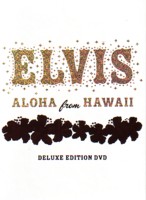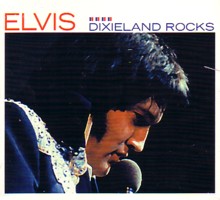Feel A Hunk O’ Burnin’ Love with
The Bluegrass Elvises, Volume One
............Shawn Camp & Billy Burnette
|
Available August 16, 2007 to commemorate the 30th anniversary of the death of Elvis Presley
July 1, 2007 - Nashville, TN
On July 6, 1954, in a 30 x 18 foot recording studio at 706 Union Avenue in Memphis, TN., a 19-year old hopeful with the unlikely name of Elvis Presley grabbed an acoustic guitar and dared to do the unthinkable. With a doghouse bass and a primitive electric guitar egging him on, he put a gnawing scrub rhythm to Bill Monroe’s “Blue Moon of Kentucky,” changing Monroe’s elegant waltz to a 4/4 rockabilly tune, and charging both forms with the slurred vibrato that would become his signature. “Fine, man! Hell, that’s different,” Sun Studio owner Sam Phillips famously remarked. “That’s a pop song now, nearly ‘bout!”
What had started as a parody became the B-side of Presley’s first single. But in the fall of 1956, when Elvis played Monroe’s 1947 classic on his only appearance on the Grand Ole Opry, he approached the Father of Bluegrass backstage in his dressing room and apologized.
“I thought he had a beautiful voice,” Monroe recalled in the ‘80s, speaking in his brittle husk of a tenor. “I told him, “Well, if it give you your start, it’s all right with me.” But it also made Monroe re-think his own composition, and the elder musician later re-recorded the song, shoving the tempo up into overdrive and showcasing a syncopated mandolin break as a hallmark of the bluegrass idiom.
Rules, it seems, are made to be broken. Which brings us to the Bluegrass Elvises, aka bluegrass/country singer Shawn Camp and rockabilly/country performer Billy Burnette, who spent nearly a decade with Fleetwood Mac and now tours frequently with John Fogerty. Shawn is yin to Billy’s yang. And both men are steeped in the snaky soul of the Tennessee-Arkansas mythology of the ‘50s, born of the spirit of Elvis.
Billy, whose father Dorsey and uncle Johnny Burnette used to kick a young Elvis out of their rehearsals in the laundry room at the Lauderdale Courts housing project, had so many connections to Presley—with Crown Electric and Humes High figuring prominently in their shared stories—that they felt like kin.
“They were all good buddies, they all knew the same people, [guitarist] Scotty Moore and [bass player] Bill Black,” Billy says. “Elvis used to call the house a lot.” Things were happening so fast in the early ‘50s--when Billy and his cousin, Rocky, were born three weeks apart, their dads named their new “rockabilly” style after them—that at first it was hard to tell which Memphis practitioner would get famous first. Billy, with a pair of black sideburns in his future, would meet them all, including Elvis on a downtown Memphis street during his “Teddy Bear” era.
Two hundred miles over in Arkansas, Shawn would grow up grooving on his parents’ Sun singles, his fascination eventually leading to a peanut butter and banana-fed addiction. In years to come, Presley fervor would take such a firm grip on his psyche that he would get, as Elvis might put it, “real, real gone.” He’d make all the pilgrimages—stopping at Graceland every time he went through Memphis, even seeking out the forgotten grave of Elvis’s paternal grandfather in Louisville. The cab of his truck became a cocoon, a nesting room spun from the sounds of the Sirius Elvis channel. And when he put his mind to it, he could imitate Elvis’s Whitehaven-via-Tupelo drawl so perfectly as to maybe even fool mama Gladys.
Fate has a way of bringing such people together, of course. Labelmates at Warner Bros. in the early ‘90s, Billy and Shawn eventually joined to play a little music together, and to write more than 100 songs, including Alan’s Jackson’s “Burnin’ the Honky Tonks Down” and Del McCoury’s “My Love Will Not Change.”
Then, in 2003, as on that seminal day at Sun in 1954, genius raged. Shawn, mindful that country music was at the heart of such early Elvis offerings as “I’m Left, You’re Right, She’s Gone” and “I Forgot to Remember to Forget,” made a furtive notation on a piece of paper...something about doing an album of Elvis songs high-lonesome style. A few weeks later, he and Billy were at the Nashville studio of Cowboy Jack Clement – the famed engineer who watched it all go down at Sun and has the scratches Elvis made on his guitar to prove it – when producer David Ferguson walked in and off-handedly suggested they cut a bluegrass Elvis record. “It all came together right then,” Shawn remembers. “And a month later we started cutting on this thing.”
First session: January 8, Elvis’s birthday, at Ferguson’s tiny Naughty Pines studio. With Dave Talbot on banjo and Terry Eldridge thumping bass--Aubrey Haynie would later replace Shawn’s own fiddle parts--they kicked into “Good Rockin’ Tonight,” “Mystery Train,” and “A Big Hunk O’ Love.” Even they were surprised with what they had. When they played back the ‘grassy yipping on “Good Rockin’ Tonight,” a delightfully eerie sound that threatened to reach into the stratosphere, everybody’s hair stood on end.
The melding of bluegrass and rockabilly turned out to be such an organic synthesis that it went down smooth and easy, Billy’s rocking, back-alley swagger twining with Shawn’s joyous, hillbilly tenor in a sweet siren call of seduction: “She said, ‘Meet me in a hurry out behind the barn’/Don’t you worry baby I’ll do you no harm.’” At the end, it’s easy to imagine the ghost of Bill Monroe crowing, “That’s different! That’s a bluegrass song now, nearly ‘bout!”
Still, the album languished for several years, until Shawn mentioned it to Tamara Saviano, the Grammy winning founder of American Roots Publishing. Saviano enthusiastically sanctioned the project, and a second session was quickly underway, this time at the Butcher Shoppe with sidemen Scott Vestal (banjo), Chris Henry (mandolin), Aubrey Haynie (fiddle) and Mike Bub (bass). As before, the vibe in the studio was blue suede bliss, beginning with the 28-second intro, “2007: A Bluegrass Oddity,” a brilliant, if hilarious take on “Also Sprach Zarathustra,” the Richard Strauss tone poem widely known from Stanley Kubrick’s 1968 film “2001: A Space Oddyssey,” and which Presley used to open his shows in the ‘70s.
“We’re not making fun of either bluegrass or Elvis, but we laughed a lot on this record, hearing some of the classic Elvis licks done in a bluegrass fashion,” Billy says, recalling the fiddle flourishes on “Little Sister,” the mandolin fills on “Hound Dog,” and the banjo zings on “A Big Hunk O’ Love.” (The latter rendition was inspired as much by Bonnie Raitt’s version as Presley’s.) Most of the songs have been totally recast, “Don’t Be Cruel” standing as one of the few songs that retain the original tempo. For “Blue Suede Shoes,” the two pulled nuances from Bill Monroe’s “Heavy Traffic Ahead,” and added jazz, western-swing, and jump blues stylings.
Other surprises abound: Shawn’s masterful and heartfelt recitation on “Are You Lonesome Tonight,” where Haynie lays down a mournful twin-fiddle effect; Billy’s switchblade sharp vocal on “Jailhouse Rock,” perhaps the first understandable reading of the lyrics; and the inclusion of original verses of “Hound Dog” that Elvis chose not to record.
“I did the Elvis version up front, and then at the end I did the Big Mama Thornton lyric, but a little bit from the male perspective,” Shawn says of the latter song. “And I used her attack, the way she emphasized specific words.”
The project was so inventively fun that everyone stayed behind long after the sessions had ended. “I’ll tell you,” Shawn recalls, “it’s rare that you work on a record and even at the mix stage, listen back and enjoy it so much that you’re almost dancing around. And everybody in the studio was doing it. It all just fell into place. Maybe that was the spirit of Elvis, coming back and guiding us along.”
Billy got a stronger jolt from the blue when his cell phone rang and the caller I.D. spelled out Graceland. “That was so cool! Elvis on the line!” It turned out to be an invitation from [Elvis cronie and DJ] George Klein to appear on a radio show. But Billy and Shawn often ponder what Elvis would be like today if he had lived. The two wrote a song about it, which they may include on a second volume. Which seems sorely needed. After they finished volume one, Billy realized, “God, we forgot to do ‘Blue Moon of Kentucky!’”
Chances are, Elvis will haunt them until they make it right. The polite Mr. Presley will want to repay Bill Monroe for the favor of a song that started it all. Thirty years after his death, Elvis is still influencing a broad spectrum of genres, even as he once borrowed from them.
--Alanna Nash
For more information:
International Publicity: Alanna Nash / talkshak@iglou.com / 502-896-0149
International Distribution: John Lomax, Roots Music Exporters / lomax3@comcast.net / 615-356-4684
North American Publicity/Bluegrass Elvises Management: Tamara Saviano / TSaviano@comcast.net / 615-400-0388
Download media kits at http://www.ellis-creative.com/bluegrass.html
.
|
|






